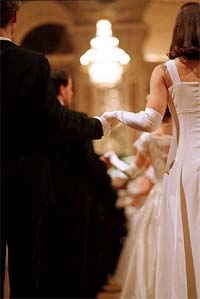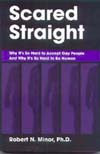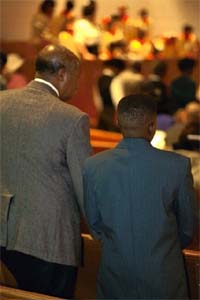 |


|
|
What's Tradition For? |
|
By Bob Minor Minor Details
 I think it was a French skeptic who observed: "History is just one damn
thing after another." And Henry Ford agreed: "History is bunk."
I think it was a French skeptic who observed: "History is just one damn
thing after another." And Henry Ford agreed: "History is bunk."
Not true. We need to know our history to see how much is possible and to be aware of all that has been accomplished by our predecessors. History tells us how we got to this place, for better or for worse, and whether we're stuck here or not (usually not). But in what sense does history somehow provide us with our norms, tell us how things should be, or model what must be done? And are we victims of our past? Those are questions we need to ask when we hear someone use that loaded word: "tradition." That's because the basic issue is: just because something is traditional, does that make it good, moral, humane, just, caring, or even valuable enough to preserve? Now, a lot of things are traditional because they've made it down through history, sometimes against apparently overwhelming odds. Slavery is traditional. Women idealized as male property is traditional. Living with cockroaches is traditional. So are an assortment of diseases such as small pox, typhoid, and pneumonia. To fight them is to go against the weight of tradition. Yet often the word has been evoked to claim that certain things shouldn't change, as if we are expected to assume that because something is traditional it's better than things that aren't. "Love one another" is a traditional recommendation, but its value doesn't rest in the fact that it is an old idea, and certainly not in whether or not it's traditionally been widely practiced. That something is "traditional" has been used to argue against LGBT people just as it has against any group that a dominant culture has marginalized. If one thing is surely traditional, it's discrimination. "Traditional family values," seems to refer to the values of white, patriarchal, discipline-oriented, middle-class families of the 1950's. Those values are supposed to be better than treating women and children as full human beings who are as good as grown-up males, or recognizing the value of letting people love whomever they choose.
Religious traditions are defined by authorities who see themselves as somehow more qualified than the rest of us. They include only some of the ideas, events, and morals from religious history while ignoring many others. Then these traditions are used to tell people who they are and confine them inside internalized, restrictive psychological, emotional, and social boundaries that promote guilt, condemnation, and self-hate in those, often l/g/b/t people, who don't fit in. It's an emotional attachment to a tradition that imprisons. For we were not taught that a tradition is valuable and true merely through logical discussions of it with us. Traditions were given to us as members of a community, which may have included our immediate families -- a community that defined us, accepted us, affirmed us, and validated us. And we learned that that community would do so until we stepped outside of its "traditional" beliefs to live on our terms for ourselves. As l/g/b/t people come out to themselves and the world about them, their attachment to these communities and their way of seeing things is emotionally difficult to sever. They find themselves putting much of their emotional energy in relating to, arguing against, or obsessing over these traditions even if the traditions actually invalidate l/g/b/t people. Those outside a tradition can be baffled by why the stuck ones just can't get over it.
And all traditions at one time were new. They began as something other than traditional. So who says that you and I cannot define today for ourselves what is a part of our tradition and what is not? And what loss, abandonment, fear, guilt, and emptiness would we feel if what we chose was different from that of our parents, our religious communities, or other cultural institutions? Though we may believe the voices that say we can't, shouldn't, or aren't able to do so, the fact is, we are fully capable of choosing for ourselves. It's a decision we can make. It's our choice to make and define our own traditions. It's also our choice whether or not to be a part of the traditions defined by others. A refreshing new book coauthored by L. William Countryman and M.R. Ritley entitled Gifted by Otherness (2001) is must reading for any l/g/b/t person who still wants to remain a part of "the Christian tradition." It's a model of no longer living as l/g/b/t victims of Christianity. We are not victims of anyone else's definitions or traditions. We do not need to live under the belief that we are only worthy human beings when others will love us. We can be as innovative as we want. We can choose what to value. We can choose what ideas and beliefs will define us. We can choose to be victims of "tradition" no longer.  Robert N. Minor is author of Scared Straight: Why It's So
Hard to Accept Gay People and Why It's So Hard to Be Human and
Professor of Religious Studies at the University of Kansas. He may be
reached at Minor@libertypress.net.
Robert N. Minor is author of Scared Straight: Why It's So
Hard to Accept Gay People and Why It's So Hard to Be Human and
Professor of Religious Studies at the University of Kansas. He may be
reached at Minor@libertypress.net.
|

© 1997-2002 BEI
 "Traditional understandings of the Bible" are assumed to be better than
those of modern scholarship, especially if they are taken to condemn
anything that threatens "traditional family values." Words like
"revisionism" and "modernism" are used as putdowns. And this is so even
if these "traditional" interpretations actually were developed as late
as the twentieth century.
"Traditional understandings of the Bible" are assumed to be better than
those of modern scholarship, especially if they are taken to condemn
anything that threatens "traditional family values." Words like
"revisionism" and "modernism" are used as putdowns. And this is so even
if these "traditional" interpretations actually were developed as late
as the twentieth century.